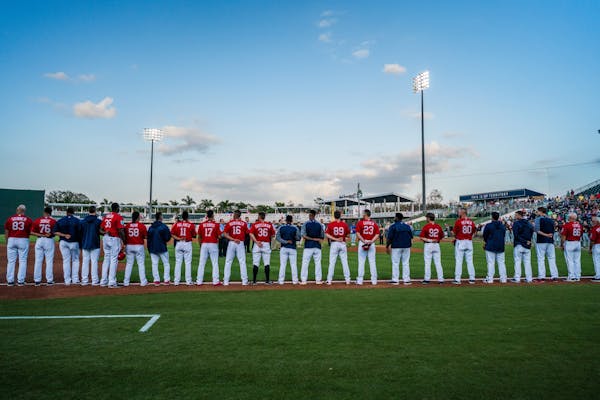FORT MYERS, Fla. – Addison Reed has it all backward. That might be what the Twins liked best about him.
Most big-league closers work their way into that role, often after several years of seasoning at both the minor league and major league levels, before being trusted with the ninth-inning job. Reed wasn't really groomed for the job in the minors — he managed only six total saves while playing for five minor league teams — but was anointed as the White Sox closer practically from the moment he arrived in Chicago.
And while he racked up 101 saves in the first three years of his major league career, Reed realized he had a glaring problem. "I didn't really know how to pitch," he admits. "I was just winging it. I was a thrower, not a pitcher. When I was younger, my fastball was in the mid-90s, and I was just raring back and throwing heat."
Three trades and a free-agent negotiation later, Reed finds himself with the Twins — the highest-paid, and perhaps most highly regarded, member of the revamped bullpen. Yet the Twins' plans call for the 29-year-old Californian to pitch not the ninth inning, but the eighth. Or maybe the seventh. Or in a critical spot, conceivably even the sixth.
And Reed loves that idea.
"I've said from Day 1, if I pitched the second inning, I'd have the same mindset as if I'm closing," Reed said. "I really don't care when I pitch. I just want us to win."
That's what manager Paul Molitor wants, too, and after three seasons of what he says seemed like "flipping a coin sometimes" to find an effective reliever, he's thrilled to have multiple options for the late innings this year. Reed signed a two-year, $16.75 million contract in January, several weeks after soon-to-be-41 Fernando Rodney agreed to a one-year deal to be the closer. The team envisions Rodney collecting saves, but Reed delivering the opportunities to him.
"The bigger the situation, the more he wants to be out there. And he's got the stuff to back it up," Molitor said. "He's not concerned about being the guy, he just wants to get big outs whenever that'll be. I'm looking for the best way to use Reed to get to Rodney."
Reed's numbers show that he's been better as a setup man than a closer, even though he now has 125 career saves, 16th-most among active relievers. Reed owns a career 3.84 ERA in save situations, and that number is below 4.00 due to a successful 19-saves-in-21-chances stint filling in for the injured Jeurys Familia with the Mets last year. Reed's saves weren't always the cleanest, either; 21 came in games in which he allowed a run. The only pitcher with more bend-but-don't-break saves since Reed arrived in the majors? Oh, right: Fernando Rodney.
But in non-save outings, Reed's ERA is 3.14 — a number that fueled the Twins's interest in signing him. His home runs per nine innings drop from 1.16 to 0.89, his walks per nine plummet from 3.11 to 1.87.
"It's up to Paul to sort out how to use them, but Addison's history is as a pitcher who can thrive when you must have a critical out, no matter when it comes," said Derek Falvey, the Twins chief baseball officer. Signing Reed "was an opportunity to solidify the bullpen as a far more effective roster of pitchers than maybe we've had in the recent past."
Reed says it's not the role reflected in those number, though, but his experience. His move out of the closer's job in Arizona coincided with something of a eureka moment for him.
"I finally realized that locating the ball was more important than velocity. A 95-mph fastball, big-league hitters can hit that," Reed said. "I learned the importance of duplicating my mechanics. Early in my career, sometimes I'd step three inches to the left, sometimes four inches to the right, and I'd never land in the same spot. I was all over the place, and it hurt me. Now I'm consistent, I move the ball around, and I'm having fun."
